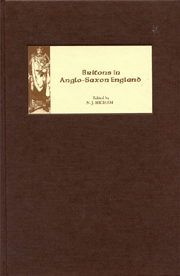Book contents
- Frontmatter
- Contents
- List of Illustrations
- List of Tables
- Contributors
- Dedication
- Acknowledgements
- Abbreviations
- 1 Britons in Anglo-Saxon England: An Introduction
- 2 Anglo-Saxon Attitudes
- 3 Forgetting the Britons in Victorian Anglo-Saxon Archaeology
- 4 Romano-British Metalworking and the Anglo-Saxons
- 5 Invisible Britons, Gallo-Romans and Russians: Perspectives on Culture Change
- 6 Historical Narrative as Cultural Politics: Rome, ‘British-ness’ and ‘English-ness’
- 7 British Wives and Slaves? Possible Romano-British Techniques in ‘Women's Work’
- 8 Early Mercia and the Britons
- 9 Britons in Early Wessex: The Evidence of the Law Code of Ine
- 10 Apartheid and Economics in Anglo-Saxon England
- 11 Welsh Territories and Welsh Identities in Late Anglo-Saxon England
- 12 Some Welshmen in Domesday Book and Beyond: Aspects of Anglo-Welsh Relations in the Eleventh Century
- 13 What Britons Spoke around 400 AD
- 14 Invisible Britons: The View from Linguistics
- 15 Why Don't the English Speak Welsh?
- 16 Place-Names and the Saxon Conquest of Devon and Cornwall
- 17 Mapping Early Medieval Language Change in South-West England
- Index
6 - Historical Narrative as Cultural Politics: Rome, ‘British-ness’ and ‘English-ness’
Published online by Cambridge University Press: 12 September 2012
- Frontmatter
- Contents
- List of Illustrations
- List of Tables
- Contributors
- Dedication
- Acknowledgements
- Abbreviations
- 1 Britons in Anglo-Saxon England: An Introduction
- 2 Anglo-Saxon Attitudes
- 3 Forgetting the Britons in Victorian Anglo-Saxon Archaeology
- 4 Romano-British Metalworking and the Anglo-Saxons
- 5 Invisible Britons, Gallo-Romans and Russians: Perspectives on Culture Change
- 6 Historical Narrative as Cultural Politics: Rome, ‘British-ness’ and ‘English-ness’
- 7 British Wives and Slaves? Possible Romano-British Techniques in ‘Women's Work’
- 8 Early Mercia and the Britons
- 9 Britons in Early Wessex: The Evidence of the Law Code of Ine
- 10 Apartheid and Economics in Anglo-Saxon England
- 11 Welsh Territories and Welsh Identities in Late Anglo-Saxon England
- 12 Some Welshmen in Domesday Book and Beyond: Aspects of Anglo-Welsh Relations in the Eleventh Century
- 13 What Britons Spoke around 400 AD
- 14 Invisible Britons: The View from Linguistics
- 15 Why Don't the English Speak Welsh?
- 16 Place-Names and the Saxon Conquest of Devon and Cornwall
- 17 Mapping Early Medieval Language Change in South-West England
- Index
Summary
IT HAS often been remarked that the British indigenes had only a minimal impact on the culture of the barbarian successor states which emerged across the lowland heartlands of the old Roman diocese. In contrast, Gaul is generally considered to have retained far more from its Roman past, as regards all of settlement continuity, spoken language, place-names and Christianity, and the comparison has had a profound effect on interpretations of early Anglo-Saxon England. The barbarian settlement of Gaul is generally seen as an elite phenomenon characterised primarily by assimilation of the culture of the indigenes. Traditional explanations of the English settlement have centred rather on mass migration coupled with displacement and/or extermination of the existing population. This model has been challenged recently, of course, with alternative theories posited on acculturation, but such have struggled to explain the very different outcomes on each side of the Channel.
To take a specific example, a recent paper by Bryan Ward-Perkins contrasted Frankish interaction with Late Antique Gaul and Anglo-Saxon contact with the Britons, concluding that:
If the Anglo-Saxons had encountered among the Britons a late Roman and Latin culture as powerful as that which the Franks found in Gaul, the cultural history of what was to become England might have been very different.
Instead, he argued, many Britons chose to become Anglo-Saxons, primarily because, in the incomers' view, native culture was ‘inferior’.
- Type
- Chapter
- Information
- Britons in Anglo-Saxon England , pp. 68 - 79Publisher: Boydell & BrewerPrint publication year: 2007



